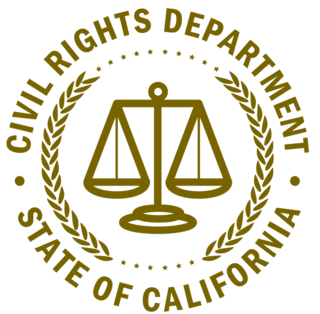
Quid pro quo is a Latin phrase used in English to mean an exchange of goods or services, in which one transfer is contingent upon the other; "a favor for a favor". Phrases with similar meanings include: "give and take", "tit for tat", "you scratch my back, and I'll scratch yours", and "one hand washes the other". Other languages use other phrases for the same purpose.
In United States labor law, a hostile work environment exists when one's behavior within a workplace creates an environment that is difficult or uncomfortable for another person to work in, due to illegal discrimination. However, a working environment that is unpleasant and frightening for the victim due to sexual advances that have been denied by the victim, is what constitutes hostile work environment sexual harassment. Common complaints in sexual harassment lawsuits include fondling, suggestive remarks, sexually-suggestive photos displayed in the workplace, use of sexual language, or off-color jokes. Small matters, annoyances, and isolated incidents are usually not considered to be statutory violations of the discrimination laws. For a violation to impose liability, the conduct must create a work environment that would be intimidating, hostile, or offensive to a reasonable person. An employer can be held liable for failing to prevent these workplace conditions, unless it can prove that it attempted to prevent the harassment and that the employee failed to take advantage of existing harassment counter-measures or tools provided by the employer.

Sexual harassment is a type of harassment involving the use of explicit or implicit sexual overtones, including the unwelcome and inappropriate promises of rewards in exchange for sexual favors. Sexual harassment includes a range of actions from verbal transgressions to sexual abuse or assault. Harassment can occur in many different social settings such as the workplace, the home, school, or religious institutions. Harassers or victims may be of any sex or gender.
Oncale v. Sundowner Offshore Services, 523 U.S. 75 (1998), is a landmark decision of the US Supreme Court. The case arose out of a suit for sex discrimination by a male oil-rig worker, who claimed that he was repeatedly subjected to sexual harassment by his male co-workers with the acquiescence of his employer. The Court held that the protection of Title VII of the Civil Rights Act of 1964 against workplace discrimination "because of... sex" applied to harassment in the workplace between members of the same sex.
Negligence in employment encompasses several causes of action in tort law that arise where an employer is held liable for the tortious acts of an employee because that employer was negligent in providing the employee with the ability to engage in a particular act. Four basic causes of action may arise from such a scenario: negligent hiring, negligent retention, negligent supervision and negligent training. While negligence in employment may overlap with negligent entrustment and vicarious liability, the concepts are distinct grounds of liability. The doctrine that an employer is liable for torts committed by employees within the scope of their employment is called respondeat superior.

The California Civil Rights Department (CRD) is an agency of California state government charged with the protection of residents from employment, housing and public accommodation discrimination, and hate violence. It is the largest state civil rights agency in the United States. It also provides representation to the victims of hate crimes. CRD has a director who is appointed by the governor of California and maintains a total of five offices and five educational clinics throughout the state. Today, it is considered part of the California Business, Consumer Services, and Housing Agency.
Meritor Savings Bank v. Vinson, 477 U.S. 57 (1986), is a US labor law case, where the United States Supreme Court, in a 9–0 decision, recognized sexual harassment as a violation of Title VII of the Civil Rights Act of 1964. The case was the first of its kind to reach the Supreme Court and would redefine sexual harassment in the workplace.
Harassment is a topic which, in the past couple of decades, has been taken increasingly seriously in the United Kingdom, and has been the subject of a number of pieces of legislation.
Equal Rights Advocates (ERA) is an American non-profit gender justice/women's rights organization that was founded in 1974. ERA is a legal and advocacy organization for advancing rights and opportunities for women, girls, and people of gender identities through legal cases and policy advocacy.
Crawford v. Nashville, 555 U.S. 271 (2009), is a United States Supreme Court case in which the Court unanimously ruled that Title VII of the Civil Rights Act of 1964 protects an employee who opposes unlawful sexual harassment, but does not report the harassment themself.
Price Waterhouse v. Hopkins, 490 U.S. 228 (1989), was a landmark decision of the US Supreme Court on the issues of prescriptive sex discrimination and employer liability for sex discrimination. The employee, Ann Hopkins, sued her former employer, the accounting firm Price Waterhouse. She argued that the firm denied her partnership because she did not fit the partners' idea of what a female employee should look and act like. The employer failed to prove that it would have denied her partnership anyway, and the Court held that constituted sex discrimination under Title VII of the Civil Rights Act of 1964.

Blakey v. Continental Airlines, 992 F.Supp. 731 and 164 N.J. 38 (2000), is a case concerning whether an employer must be held liable for harassment that can potentially occur on an internal internet bulletin board. The plaintiff brought action under the federal district court for claiming a hostile work environment sexual harassment under Title VII of Civil Rights Act of 1964 and New Jersey Law Against Discrimination (LAD). Concurrently, the plaintiff brought action under the New Jersey state court alleging that employer was liable for hostile work environment arising from allegedly defamatory statements. While the case began as a sexual harassment lawsuit, the unusual circumstances involving the piloting forum where much of the harassment took place forced the courts to explore important questions concerning liabilities for content posted in a decentralized, electronic manner as is frequently the case on the internet.
Faragher v. City of Boca Raton, 524 U.S. 775 (1998), is a US labor law case of the United States Supreme Court in which the Court identified the circumstances under which an employer may be held liable under Title VII of the Civil Rights Act of 1964 for the acts of a supervisory employee whose sexual harassment of subordinates has created a hostile work environment amounting to employment discrimination. The court held that "an employer is vicariously liable for actionable discrimination caused by a supervisor, but subject to an affirmative defense looking to the reasonableness of the employer's conduct as well as that of a plaintiff victim."

Majrowski v Guy's and St Thomas' NHS Trust [2006] UKHL 34 is a UK labour law case holding that an employer will be vicariously liable for the harassment of an employee by another.
Vance v. Ball State University, 570 U.S. 421 (2013), is a U.S. Supreme Court case regarding who is a "supervisor" for the purposes of harassment lawsuits. The Supreme Court upheld the Seventh Circuit's decision in a 5–4 opinion written by Samuel Alito, rejecting the Equal Employment Opportunity Commission's interpretation of who counts as a supervisor. The case was important because it resolved a dispute between several different circuits.
Bundy v. Jackson, 641 F.2d 934, was a D.C. Circuit opinion, written by Judge Skelly Wright, that held that workplace sexual harassment could constitute employment discrimination under the Civil Rights Act of 1964.
Sexual harassment in the workplace in US labor law has been considered a form of discrimination on the basis of sex in the United States since the mid-1970s. There are two forms of sexual harassment recognized by United States law: quid pro quo sexual harassment and behavior that creates a hostile work environment. It has been noted that a number of the early sexual harassment cases were brought by African American women and girls.
Harris v. Forklift Systems, Inc., 510 U.S. 17 (1993), is a US labor law case in which the Supreme Court of the United States clarified the definition of a "hostile" or "abusive" work environment under Title VII of the Civil Rights Act of 1964. In a unanimous opinion written by Justice Sandra Day O'Connor, the Court held that a determination about whether a work environment is hostile or abusive requires a consideration of all relevant circumstances.
Staub v. Proctor Hospital, 562 U.S. 411 (2011), is a United States Supreme Court case in which the Court held that an employer may be held liable for employment discrimination under the Uniformed Services Employment and Reemployment Rights Act (USERRA) if a biased supervisor's actions are a proximate cause of an adverse employment action, even if the ultimate decision-maker was not personally biased. This case affirmed the 'Cat's Paw' theory of liability.
Gebser v. Lago Vista 524 U.S. 274 (1998) is a United States Supreme Court ruling regarding sexual harassment in schools. The case was heard before the Rehnquist Court on March 25, 1998, and decided on June 22, 1998. In a 5-4 ruling, the Court held that a school district may be liable for a teacher’s sexual harassment of a student, but in order for an aggrieved party to recover damages under Title IX, a school official who had authority to address the alleged discrimination must have actual knowledge of the discrimination and must be deliberately indifferent.





